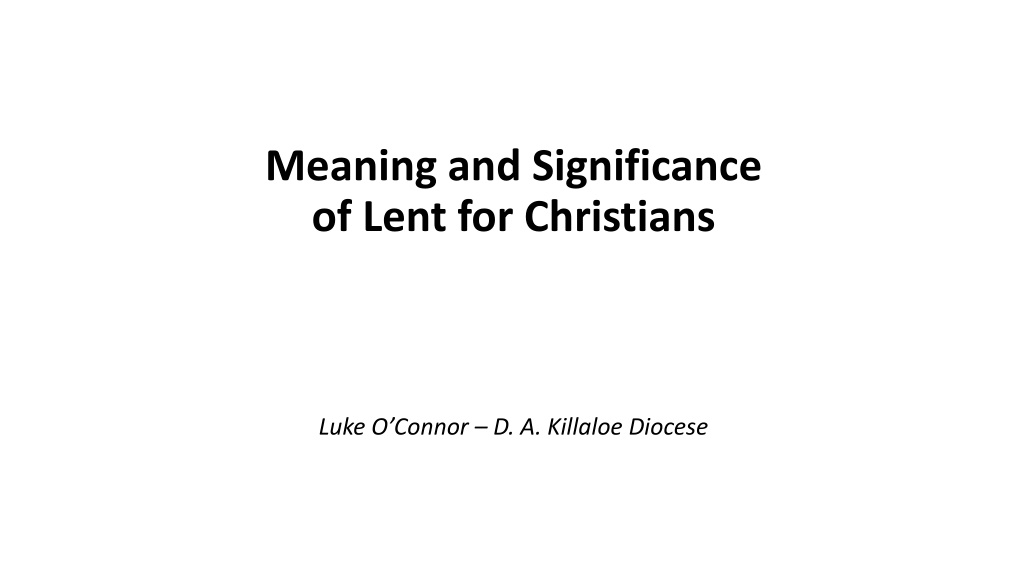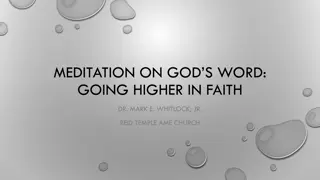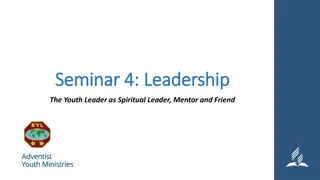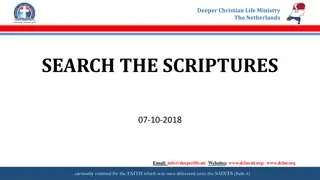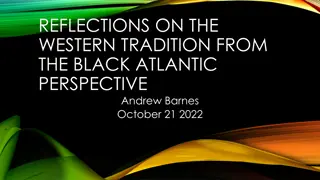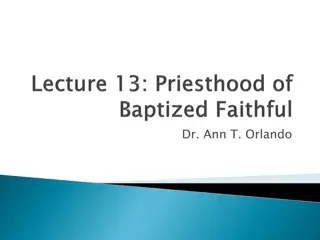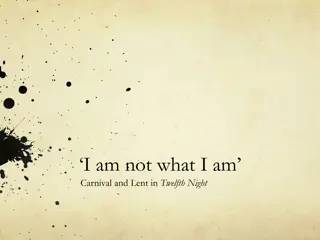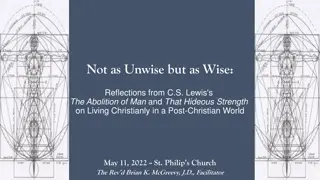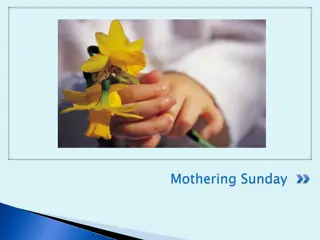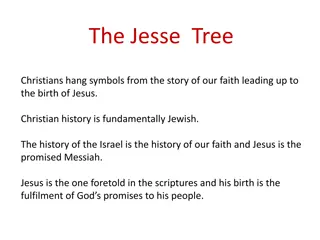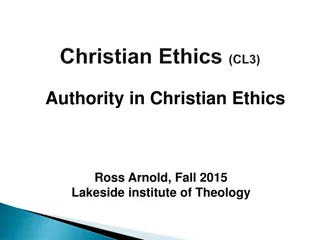Understanding the Significance of Lent in the Christian Tradition
Lent, a period of penitential preparation for Easter, is rooted in early Christian practices and marked by fasting and reflection. With historical ties to Jewish traditions, Lent symbolizes the journey of faith, self-discipline, and spiritual renewal in anticipation of Easter.
Download Presentation

Please find below an Image/Link to download the presentation.
The content on the website is provided AS IS for your information and personal use only. It may not be sold, licensed, or shared on other websites without obtaining consent from the author. Download presentation by click this link. If you encounter any issues during the download, it is possible that the publisher has removed the file from their server.
E N D
Presentation Transcript
Meaning and Significance of Lent for Christians Luke O Connor D. A. Killaloe Diocese
Christian Liturgical Year Lent within the context of Liturgical Year. Lent as preparation for Easter Easter is the most important feast in Christian calendar!
Lent comes form old English- Spring Lent, in the Christian church, a period of penitential preparation for Easter. In Western churches it begins on Ash Wednesday, six and a half weeks before Easter, and provides for a 40-day fast (Sundays are excluded), in imitation of Jesus Christ s fasting in the wilderness before he began his public ministry.
A period of preparation and fasting likely has been observed before the Easter festival since apostolic times, though the practice was not formalized until the First Council of Nicaea in 325 CE. It was a time of preparation of candidates for baptism and a time of penance for sinners. In the early centuries fasting rules were strict, as they still are in Eastern churches. In the Anglican churches The Book of Common Prayer prescribes that Lent be observed with fasting. In Lutheran and many other Protestant churches Lent is observed with various services and practices, though Lent is not formally observed in many Evangelical or nondenominational churches.
Lent as preparation for Easter Why 40 days? 40 has huge significance for the Jewish people.
Why 40? Jews wandered in the desert for 40 years Jesus fasted for 40 days in the desert. Figures have a special significance for Jewish people
Exodus Exodus marked the beginning of Israelites sense of being saved by God
Passover -Pesach The Passover Feast commemorates the liberation of the Israelites from slavery in Egypt, as recorded in the book of Exodus On Passover, Jews also celebrate the birth of the Jewish nation after being freed by God from captivity. Today, the Jewish people not only remember Passover as a historical event but also celebrate in a broader sense, their freedom as Jews. The Hebrew word Pesach means "to pass over." During Passover Jews take part in a meal known as the Seder, which incorporates the retelling of the story of Exodus and God's deliverance from bondage in Egypt.
Each participant of the Passover Seder experiences in a personal way, a national celebration of freedom through God's intervention and deliverance. The Christian Holy Week can only be fully understood within the wider Jewish faith context of celebrating Pesach/Passover.
In Human and Spiritual Life Important role of: Ritual Gathering We live in social contexts Memory We re-member, because we forget! Celebration- Important moments of life Repeated pattern of behaviour
Understanding Holy Week Understand the life, teachings, death and resurrection of Jesus. Palm Sunday to Easter Sunday. Spy Wednesday. Easter Tridium Holy Thursday Good Friday Holy Saturday/Easter Sunday
Understanding Lent as Preparation Traditional understanding of Lent as ; Time for Prayer Time for Fasting Time for Alms-giving ( helping others)
Time of Prayer Lent is a time to stop and spend some time in the presence of God. Lent challenges Christians to remember that we are made in the image of God
Ash Wednesday and Good Friday are Fast Days, days of abstinence. Fasting Traditionally Christians do not eat meat on these days In the Christian tradition fasting can only be understood properly in the context that everything comes form God. We fast to remind ourselves of this truth. Fasting and Prayer are always linked. We do not live on bread alone!
Alms- Giving The 3rd pillar of Lent is Alms-giving or helping our neighbour. One of the core messages of the Gospel teaching is that love of God and love of neighbour are inseparable. Lent is a time to reach out to others, especially those most in need of support and help. (Trocaire s work linked to Lent)
Lent as preparation for Easter Palm Sunday Spy Wednesday Holy Thursday Good Friday Holy Saturday Easter Sunday
Palm Sunday Palm Sunday marks the beginning of the end for Jesus! Marks the beginning of Easter Week Going to Jerusalem signifies facing up to his inevitable arrest and death. The glorious entry to Jerusalem is in stark contrast to Good Friday
Spy Wednesday Spy Wednesday is about betrayal. Judas pointed out Jesus to the Jewish authorities for a small sum of money. Some commentators say that he was a Zealot, part of a secret Jewish grouping and that Judas was disappointed that Jesus was not getting rid of the Romans.
Holy Thursday The washing of the feet is a powerful message about how Jesus sees his role in terms of service. In turn leadership within the Christian community is seen in terms of Service.
Jesus takes the bread and wine from the Passover meal and transforms then into his Body and Blood. Eucharist Do this in memory of me!
Why was Jesus crucified? The Jewish authorities handed Jesus over to the Romans because he was claiming to be the Messiah, Son of God. Crucifixion was type of death for a criminal in Roman law. Pontius Pilate offered to free Barabbas instead. Crowds shouted- Crucify Him! Crucify Him! At about 3.00 in Golgotha, Jesus died on Cross. He was taken down and placed in the tomb before sunset.
Sunday Morning! Resurrection Early Sunday Morning the women went to the tomb to anoint the body of Jesus. He tomb was empty. Then they meet Jesus in the garden. The rush to the Upper Room to tell the other Apostles who initially don t believe them. Then in the coming days Jesus appears to the various groups of Disciples. They recognise and believe!
Resurrection Texts New Testament 4 Evangelists all have Apparition Stories of Risen Jesus. Common structure in most narratives; Jesus presents to his Disciples; Not initially recognised; Sign is given Disciples move from doubt to Believing
Jesus appears to Mary Now when she had said this, she turned around and saw Jesus standing there, and did not know that it was Jesus. Jesus said to her, 'Woman, why are you weeping? Whom are you seeking? She, supposing him to be the gardener, said to him, 'Sir, if you have carried him away, tell me where you have laid him, and I will take him away. Jesus said to her, 'Mary!' She turned and said to him, 'Rabboni!' (which is to say, Teacher) (John 20:14-16).
They either saw Jesus Christ alive-and-well after His death or they did not. If it was all just a lie, why would so many perpetuate it given their circumstances? Why would they all knowingly cling to such an unprofitable lie in the face of persecution, imprisonment, torture, and death? The Apostles underwent an undeniable change following the alleged post-resurrection appearances of Christ. They took to the streets, boldly proclaiming the resurrection despite intensifying persecution. Why the dramatic change? It certainly was not financial gain. The Apostles gave up everything they had to preach the resurrection, including their lives. Proof of Proof of Resurrection? Resurrection?
Beginning of Christian Community Resurrection changes everything for Disciples They now fully believe that Jesus was the Messiah. They commit their lives to spreading the Good News
In Summary The lines of evidence for believing in Resurrection? The demonstrable sincerity of the eyewitnesses and the compelling, inexplicable change in their lives-to the point of death! The conversion and demonstrable sincerity of key antagonists- and sceptics-turned-martyrs- St Paul The fact of the empty tomb, enemy attestation to the empty tomb, The testimony of the women and the significance of such testimony given the historical context; All of these strongly attest to the historicity of the resurrection. But ultimately rests on the Faith of each believer!
Jesus Life Death and Resurrection Christians accept that Jesus Christ is the Messiah, the Son of God. That he preached the Kingdom of God in word and deed. That he preformed miracles. That he was crucified, died and rose again. That everything that he said about Life and God the Father was true. Easter is a celebration of that life, death and resurrection. Lent is a preparation for Easter.
In Summary! For Christians Lent is a preparation for the most important time of the liturgical year- Easter. It is 40 days of Prayer Fasting Helping others It is a special time when we call to mind God s gift of his Son to the world!
In Summary! For Christians Lent is. Lent is a time of personal renewal through Prayer Fasting Helping others A time of personal reflection on one s life, direction, priorities A time of re-commitment to Christ and Christian vision. A time of preparation for the celebration of Easter
Christ is Risen! Alleluia!
